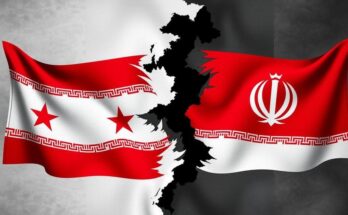The article discusses the baseless criticisms of Azerbaijan ahead of the COP29 Climate Change Conference, primarily targeting its oil and gas production. It highlights Azerbaijan’s minimal global greenhouse gas emissions and its investments in green energy, contrasting this with the significant emissions from the EU and USA. It also addresses the political motivations behind criticisms and the need for constructive participation in climate action.
A recent campaign targets Azerbaijan amid the upcoming COP29 Climate Change Conference, with intentions to obstruct participation from key Western representatives. The main criticism focuses on Azerbaijan’s status as an oil and gas producer, arguing that such involvement disqualifies the nation from spearheading climate initiatives. However, this stance is hypocritical when considering that Azerbaijan only contributes a mere 0.1% to global greenhouse gas emissions, contrasted with the EU and USA, which account for approximately 20% of atmospheric pollution. Furthermore, it raises questions about the EU’s recent agreements with Azerbaijan to increase gas supplies while expressing concern over hydrocarbon emissions. Azerbaijan is not solely defined by its fossil fuel production; rather, President Ilham Aliyev emphasized the nation’s investment of oil and gas revenues into green energy, illustrating a commitment to a sustainable future despite its economic reliance on hydrocarbons. The country demonstrates that it is possible for smaller emission contributors to play a pivotal role in addressing climate change. In an ironic twist, as Azerbaijan faces unsubstantiated accusations from various adversaries, including absurd claims of ethnic cleansing, the European Parliament focuses on these politicized grievances rather than the pressing issue of climate change. MEPs like Xavier Bellamy denounce Azerbaijan’s actions regarding Nagorno-Karabakh and push for sanctions against Azerbaijani officials, diverting attention from the upcoming climate conference. While the world grapples with the climate crisis, it appears that Western lawmakers are risking financial commitments tied to the climate agenda outlined in the Paris Agreement. In light of intensive discussions aimed at enhancing climate financing from $100 billion to potentially $1 trillion, the prospect of accumulating significant debt could provoke reluctance among some nations to fully engage. Addressing climate change demand sincere collaboration, and suggests that the discourse surrounding Azerbaijan’s leading role at COP29 has become entangled in broader geopolitical and economic interests, potentially engendering a rift between the Global South and the developed world.
The article reflects on the criticisms aimed at Azerbaijan ahead of the COP29 Climate Change Conference. It highlights the arguments against Azerbaijan’s involvement due to its role as a hydrocarbon producer while underscoring the nation’s minimal contribution to global emissions. Furthermore, it provides context regarding the motivations behind these critiques, suggesting that they may stem from geopolitical tensions rather than genuine environmental concerns. The discussion emphasizes the imbalance in responsibilities among developed nations versus less developed nations when it comes to climate financing and action, thereby framing Azerbaijan’s stance as a potentially cooperative example in the quest for climate solutions.
In summary, the criticisms directed at Azerbaijan regarding its oil and gas production appear to obscure the larger context of global greenhouse gas emissions and financial obligations tied to climate initiatives. With Azerbaijan demonstrating a commitment to green energy investment, the accusations seem misplaced and politically motivated. The focus of Western lawmakers should pivot towards constructive involvement in COP29 in Baku, recognizing the urgency of collective action against climate change rather than being led astray by populism and demagoguery. Acknowledging the significant historical debt owed to developing countries is crucial for building a coherent climate strategy that promotes cooperation over division.
Original Source: aze.media




